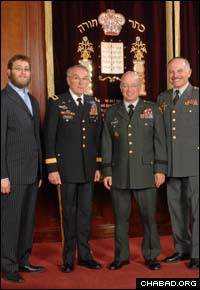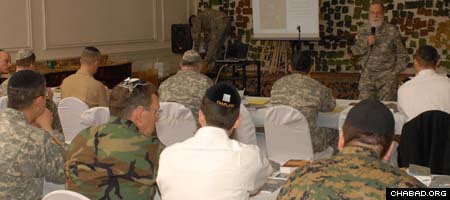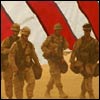Some 50 Jewish soldiers and chaplains from all branches of the U.S. military, and their family members, turned out for the Feb. 8-9 military Shabbaton hosted by the Aleph Institute at The Shul of Bal Harbour in suburban Miami.
The Aleph Institute, a Chabad-Lubavitch program that provides Jewish soldiers with educational opportunities, on-base Shabbat and holiday programming and kosher food packages, organized the Shabbaton in order to allow soldiers stationed close to home and at far away bases to join their families for a spiritually uplifting weekend. According to organizers, though, the gathering was just as inspiring for The Shul's congregation.
The traditional Friday-night dinner took place in an ornately decorated outdoor tent, where military leaders and chaplains spoke about the importance of religious connections to America's Jewish service personnel.
"It really impacted me how devoted these Jewish servicemen and women are, both to their faith and to their country," said dinner guest Pnina Wuensch. "They stay true to themselves and our people, and express their gratitude for the freedom we know and cherish in the United States, by putting themselves in harm's way to protect our country."
In his keynote address, Army Maj. Shmuel Felzenberg, a rabbi and chaplain who came to the dinner with his wife and six children, spoke about the self-sacrifice that soldiers and their families make.
"When I left for Afghanistan, my youngest daughter was three," said Felzenberg. "When I came home three weeks ago, she was five."
Felzenberg contrasted feelings of victory and pain at, on the one hand, reading the Scroll of Esther during a Purim celebration inside one of former Iraqi president Saddam Hussein's palaces, and, on the other, witnessing the extreme poverty of Afghanistan's citizens.
For The Shul community, it was an eye-opener in many respects.
"I never knew that army chaplains actually go out with the battalions on a mission," said Vivian Perez. "I thought they stayed in a safe place at the base. It was a real revelation to learn that they also form part of the military on the front lines."
Help on the Front Lines

"The information and inspiration that the chaplains brought out in their [sermons] highlighted how important their work is around the world," said Chana Tibor, who with her husband, Rabbi Yehoshua Tibor, works on outreach projects for The Shul. "Their knowledge and dedication must be a tremendous encouragement and support to the Jewish soldiers at their units."
Shachnow, whose entire family perished in the Holocaust, reflected on his life as a child, first as a survivor of the ghetto-turned-concentration camp in Kovno, Lithuania, then as an immigrant in the 1950s United States. Continuing his biography, he said he spent 32 years in the special forces following his enlistment.
The general saw irony at first being liberated by the Russian army, and then returning to Europe as commander of the famed Berlin Brigade and its mission protecting West Germany from the Russian Army.
"This forum that the Aleph Institute is providing is extremely important," he said. "You are giving the Jewish military community a strong voice."
During a lavish Shabbat lunch, Col. Jacob Goldstein, a Chabad-Lubavitch rabbi and chaplain who joined the armed forces 30 years ago, spoke about the importance of the Aleph Institute's work.
"When we send an e-mail asking for matzah, we know that you take us seriously," he stated. "Soldiers might be going to the front lines and need to take it with them. We don't know who will return safely, and who won't."
Sgt. Moshe Lans explained how military procedures can make it difficult for Jewish soldiers to get the items they need for Shabbat and the Jewish holidays.
"There's a lot of paperwork, a lot of red tape," he said. "The Aleph Institute changed all that. One e-mail with a request for grape juice or even tefillin, and we know the package is on its way the very same day. We can rely on it every time, and there are no words to describe what that means to us."
After morning prayers the next day, the visitors took part in the Aleph Institute's first-ever military chaplaincy training conference. Rabbi Sholom D. Lipskar, founder of the institute and director of The Shul, opened the conference with a session on Judaism's moral and ethical perspectives on terrorism and war.






Start a Discussion